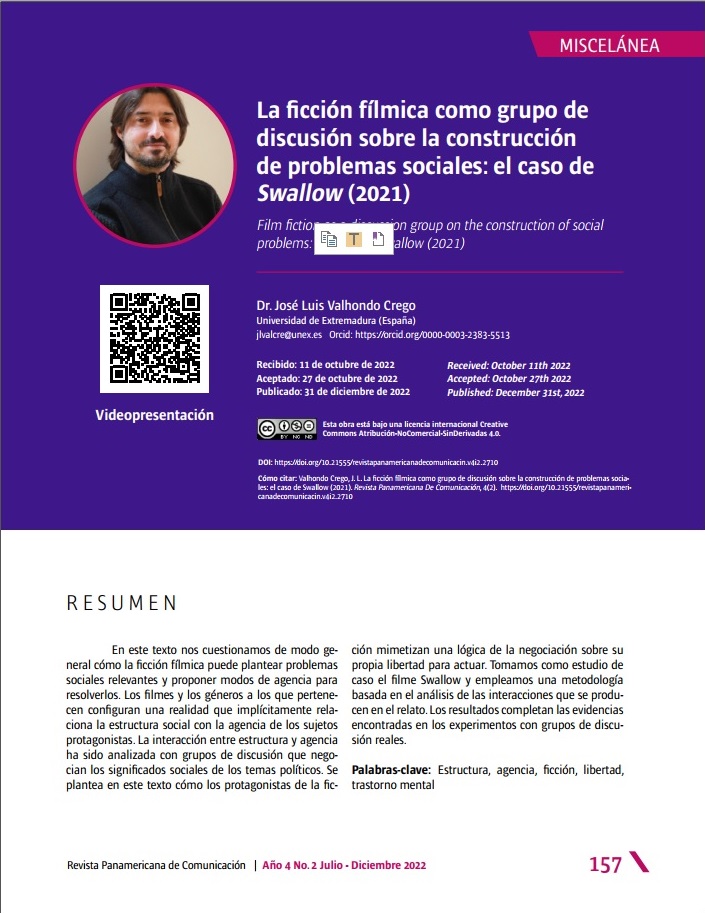La ficción fílmica como grupo de discusión sobre la construcción de problemas sociales: el caso de Swallow (2021)
Contenido principal del artículo
Resumen
En este texto nos cuestionamos de modo general cómo la ficción fílmica puede plantear problemas sociales relevantes y proponer modos de agencia para resolverlos. Los filmes y los géneros a los que pertenecen configuran una realidad que implícitamente relaciona la estructura social con la agencia de los sujetos protagonistas. La interacción entre estructura y agencia ha sido analizada con grupos de discusión que negocian los significados sociales de los temas políticos. Se plantea en este texto cómo los protagonistas de la ficción mimetizan una lógica de la negociación sobre su propia libertad para actuar. Tomamos como estudio de caso el filme Swallow y empleamos una metodología basada en el análisis de las interacciones que se producen en el relato. Los resultados completan las evidencias encontradas en los experimentos con grupos de discusión reales.
Detalles del artículo
Sección

Esta obra está bajo una licencia internacional Creative Commons Atribución-NoComercial-SinDerivadas 4.0.
Cómo citar
Referencias
» Berlin, I., 1969, Two Concepts of Liberty. EN I. Berlin, Four Essays on Liberty, London Oxford University Press, pp. 118–72.
» Boal, A. (2002). Games for Actors and Non-actors. London, Psychology Press.
» Curtis, Adam (2007). The Trap. Recuperado el 10 de octubre de 2022 de https://thoughtmaybe.com/the-trap/
» Ferree, M. M., Gamson, W. A., Gerhards, J., & Rucht, D. (2002). Shaping Abortion Discourse: Democracy and the Public Sphere in Germany and the United States. Cambridge, Cambridge University Press. En https://doi.org/10.1017/CBO9780511613685
» Foucault, M. (2004). Vigilar y castigar: Nacimiento de la prisión. Madrid, Siglo XXI Editores.
» Friedkin, W. Friedkin, W. (Director) (1973). El exorcista. Warner Bros., Hoya Productions
» Gamson, W. A. (1992). Talking Politics. Cambridge, Cambridge University Press.
» Gamson, W. A., Croteau, D., Hoynes, W., & Sasson, T. (1992). Media Images and the Social Construction of Reality. Annual Review of Sociology, 18, 373-393.
» Gay, P. du, Hall, S., Janes, L., Madsen, A. K., Mackay, H., & Negus, K. (2013). Doing Cultural Studies: The Story of the Sony Walkman.London, SAGE.
» Giddens, A. (1971). Capitalism and Modern Social Theory: An Analysis of the Writings of Marx, Durkheim and Max Weber. Cambridge, University Press. En https://doi.org/10.1017/CBO9780511803109
» Graeber, D., & Wengrow, D. (2021). The Dawn of Everything: A New History of Humanity (First Edition). New York, Farrar, Straus and Giroux.
» Laclau, E. (2005). On Populist Reason. London, Verso Books.
» Lukes, S. (2007). El poder: Un enfoque radical. Siglo XXI de España Editores.
» Neumann, S. (Dir.) (2020). Le temps des ouvriers. Miniserie TV. En https://www.flmafnity.com/es/flm906270.html
» Petty, R. E., & Cacioppo, J. T. (1984). The effects of involvement on responses to argument quantity and quality: Central and peripheral routes to persuasion. Journal of Personality and Social Psychology, 46, 69-81. https://doi.org/10.1037/0022-3514.46.1.69
» Polanski, R. (Director). (1968).La semilla del diablo. William Castle Productions.
» Scott, J. C. (1985). Weapons of the Weak: Everyday Forms of Peasant Resistance. New Haven, CT, USA, Yale University Press.En https://www.jstor.org/stable/j.ctt1nq836
» Mirabella-Davis, C. (Dir)v(2019). Swallow. Charades, Stand Alone Productions, Logical Pictures.
» Taylor, Charles. (1985). What’s Wrong With Negative Liberty. En Philosophy and the Human Sciences: Philosophical Papers, vol. 2. Cambridge, Cambridge University Press, pp 211–29.
» Valhondo, J. L., & Vivas, A. (2020). La construcción de personajes audiovisuales: Habilidades informativas. Barcelona: Gedisa.
» Watzlawick, P. (1963). A Review of the Double Bind Theory. Family Process, 2(1), 132-153.En https://doi.org/10.1111/j.1545-5300.1963.00132.x
» Weber, M. (2019). Economy and Society. Cambridge, MA, USA, Harvard University Press

